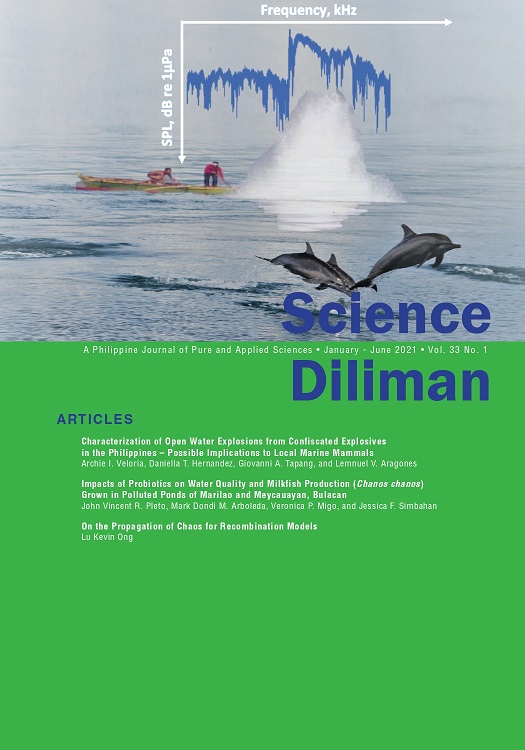Impacts of Probiotics on Water Quality and Milkfish Production (<i>Chanos chanos</i>) Grown in Polluted Ponds of Marilao and Meycauayan, Bulacan
Abstract
The Marilao-Meycauayan-Obando River System is known to be heavily polluted with organics and heavy metals, thus affecting the ecosystem. This study used probiotics as an ecological approach to improve environmental quality, with a focus on determining the impacts of probiotics on fish health and survival as well as water quality. Probiotics are microbial feed supplements that can improve the survival and health of organisms. Probiotics were applied at the start and after two months of culture period. Physico-chemical water quality parameters were recorded. Growth parameters such as fish body weight, feed conversion ratio (FCR), and survival rate were determined. Polymerase chain reaction- denaturing gradient gel electrophoresis (PCR-DGGE) method was used to determine the microbial community present in the guts of milkfish (Chanos chanos) grown in polluted water treated with probiotics. The results showed that ponds treated with probiotics had higher dissolved oxygen and lower biochemical oxygen demand (BOD) and nitrate and phosphate levels, which are beneficial for the growth of milkfish. However, higher ammonia and chemical oxygen demand (COD) were observed in the probiotic ponds. Higher survival rate (95.3%) was obtained in treated ponds compared to non-treated ponds (74.1%). The FCR was less in probiotic-treated ponds (0.74) than non-treated ponds (1.35), which is beneficial for fish production. The study showed that the probiotic strains (Bacillus) were not able to establish in the milkfish gut. Instead, strains related to Cetobacterium, Clostridium, Conexibacter, Cyanobium, Cyanothece, Cylindrospermum, Helicobacter, Romboutsia, Synechococcus, and Vibrio were detected in the guts of milkfish. Overall, the probiotics had an impact on water quality and fish health through improvement of growth and survival rate.
Published
2021-06-30
How to Cite
PLETO, John Vincent R. et al.
Impacts of Probiotics on Water Quality and Milkfish Production (Chanos chanos) Grown in Polluted Ponds of Marilao and Meycauayan, Bulacan.
Science Diliman: A Journal of Pure and Applied Sciences, [S.l.], v. 33, n. 1, june 2021.
ISSN 2012-0818.
Available at: <https://journals.upd.edu.ph/index.php/sciencediliman/article/view/7757>. Date accessed: 19 aug. 2025.
Issue
Section
Articles
Keywords
probiotics, water quality, Chanos chanos, PCR-DGGE (polymerase chain reaction-denaturing gradient gel electrophoresis), microflora
Submission of a manuscript implies: that the work described has not been published before (except in the form of an abstract or as part of a published lecture, review, or thesis); that it is not under consideration for publication elsewhere; that its publication has been approved by all co-authors, if any, as well as by the responsible authorities at the institute where the work has been carried out; that, if and when the manuscript is accepted for publication, the authors agree to the automatic transfer of the copyright to the publisher; that the manuscript will not be published elsewhere in any language without the consent of the copyright holders; that written permission of the copyright holder is obtained by the authors for material used from other copyrighted sources; and that any costs associated with obtaining this permission are the authors’ responsibility.



